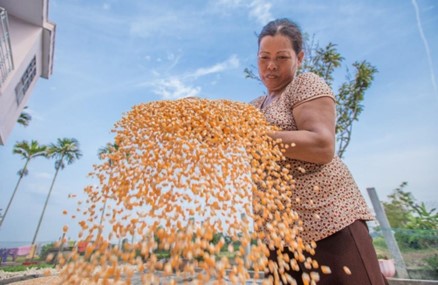Vulnerable farmers benefiting from agro-climate forecasting in Vietnam
Build understanding
Invest in local capabilities
Collaborative action and investment
Ensure transparency and accountability
Organization: CATHOLIC RELIEF SERVICES/VIETNAM
Donor: CRS INTERNAL FUNDING
Beneficiaries: 3390
Climate change is posing an increasing threat to farmers in Vietnam. In 2020 alone, nearly 200,000 hectares of rice and crops were damaged by weather, and over 50,000 cattle and 4 million poultry killed or swept away by floods. Small-scale farmers are particularly vulnerable to climate change, with extreme weather such as rain, drought, flood, and salinity the cause of widespread problems.
These weather-related challenges are exacerbated by an information gap, with many farmers and local agricultural officials unable to access local agrometeorological information and translate it into actionable and need-based recommendations. To help people protect their agricultural products from natural disaster, Catholic Relief Services (CRS) funded a pilot Agro-Climate Forecast and Information System for Enhanced Community Resilience (ACF) Project across three villages in two districts in central Vietnam covering four hectares.
The project brought together policy makers, scientists, extension workers, farmer cooperatives and members of the local communities to work on a portfolio of practices to adapt agriculture to climate change. This included significant local capacity building, which was undertaken to strengthen the capacity of farmers to understand, access and utilize agro-climate forecasts, through community-based organizations (CBOs) such as common interest groups and farmer cooperatives. The communication mechanism employed was two-way, with farmers collecting information in the field and providing feedback about the accuracy of the predictions.
Local farmer Ngo Thi Lien, who lives in Quang Nam Province, explains the benefits of accessing climate information produced by this customized information system: “Normally, farmers practice traditional techniques and don’t know how to protect their livelihoods from climate change."
"With CRS’s support, we can access the seasonal agro-climate forecast advisories, and share with others the knowledge, experience and reflection on which climate-resilient practices would be appropriately for our fields and crops, what the good practices are, and how to address the challenges of climate change and extreme weather phenomena."

Climate information system with the hydro-met station established with ACF support. Photo by Lisa Murray from CRS
The ACF project enabled farmers to access agricultural-climate information through agro-climate forecast bulletins and adapted recommendations for different crops posted on its website, and shared by email, on community notice boards, in radio broadcasts and in group meetings. The multi-stakeholder approach was facilitated by CRS, which brought everyone from academics, scientists, inter-sector agencies and policy makers together with farmer cooperatives and communities to help close the information gap.
Farmers were involved in real-time data collection and customizing bulletins and actions through iterative feedback loops. This helped them to receive and understand timely and accurate information about the weather and climate, which was critical to make adequate preparations and ensure the reliability and productivity of their crops. In addition, farmers used the bulletins to make informed decisions about farm management and the application of climate-smart techniques.
Ngo Thi Lien found that the application of improved climate-adjusted production techniques delivered dramatically improved results. Within just one year, she saw a 25% increase in her corn yields, which also required less labor. The result was a 30-50% increase in revenue in comparison with the previous season.
The ACF provided farmers with customized hydro-meteorology information and climate-adaptive farming techniques, which reduced risk of loss while also saving money. In comparison with control plots, the project measured a decrease in the amount of seed, pesticides, and chemical fertilizers used, while rice and sesame yields increased.
The approach has provided local authorities with a greater insight and more evidence as to how innovative and participatory mechanisms and decision-making processes, aligned with intergovernmental and inter-sectoral collaboration, can provide user-driven climate services. While funding ended in 2020, local authorities remain interested in seeking investments to continue the service beyond the pilot. To be sustainable and effective from a finance and implementation perspective, the project will need to expand in size so as to achieve economies of scale.
Since 2020, local authorities have continued to maintain best practices established during the pilot, with regular community meetings organized, and occasional bulletins, including agro-climate information and recommendations, disseminated to local farmers. During 2021 to 2022, CRS invested funds to conduct a deep dive assessment to document the specific strengths of ACF, as well as to better understand scaling opportunities for the approach. The results of the assessment were utilized by CRS and its government partner HYMETECH (The Center for Hydrometeorology, Environmental Training and Technology Application) to develop a proposal to the Ministry of Natural Resources and Environment to commit funds to mainstream ACF. This proposal is currently under government review, with a result expected in early 2023.

Mrs. Ngo Thi Lien collects corn product. Photo by Lisa Murray for CRS